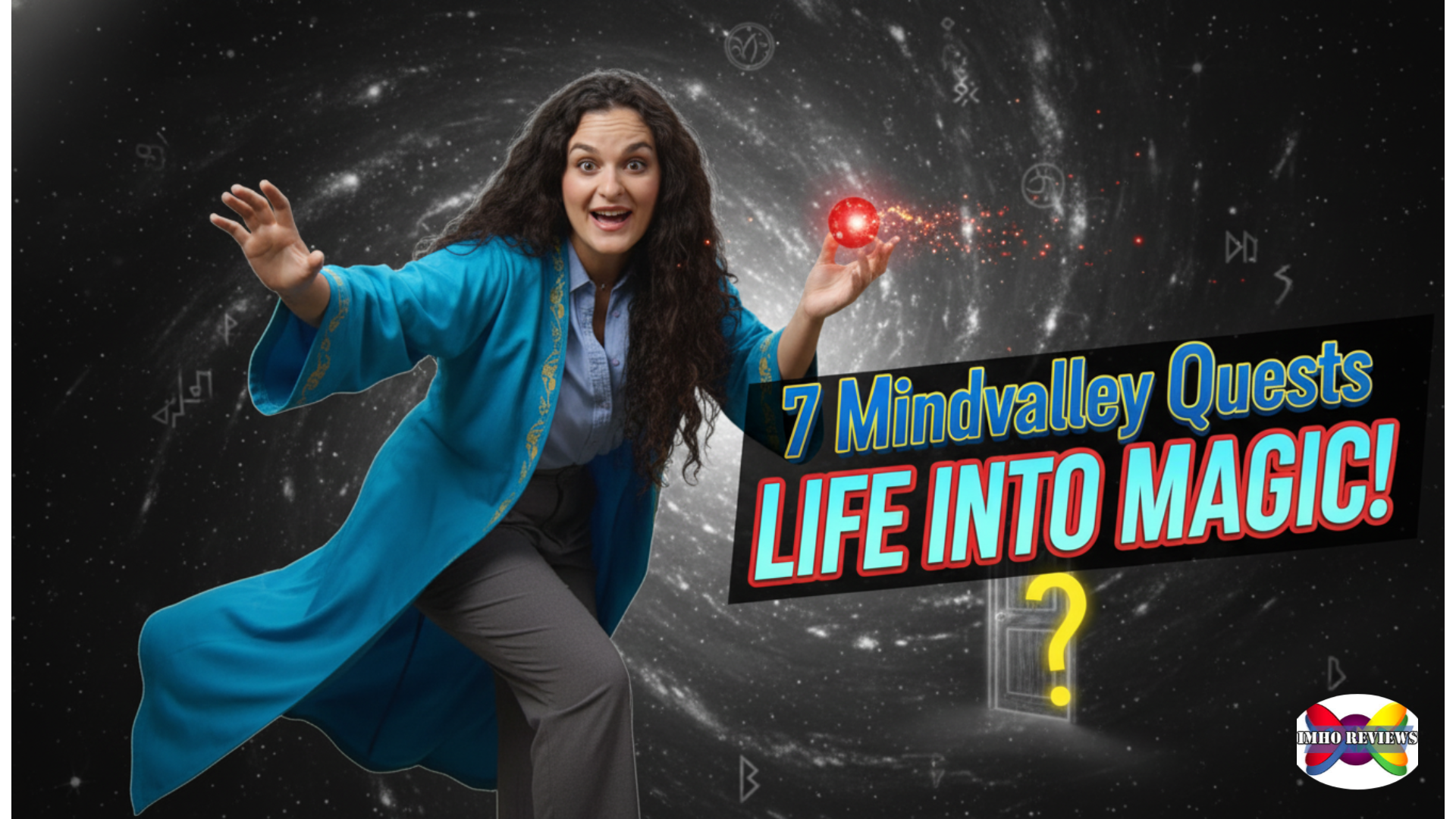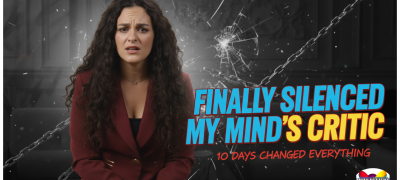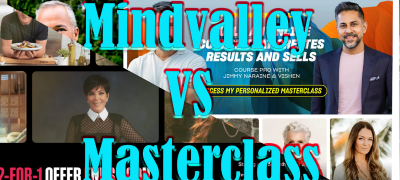Last Updated on October 30, 2025 by vitaliy
Let’s get one thing straight: a lot of self-help is just recycled fluff packaged in a slick app (it’s a key point when comparing Mindvalley vs. MasterClass). It’s taught me one thing: if you aren’t actively working on yourself, you’re falling behind. That’s why after 4 years of using Mindvalley, I’m always trying new things, from audiobooks to self-improvement programs. I got curious about Mindvalley because it’s everywhere. But is Mindvalley really worth it, or is it just clever marketing? I’ve even looked into Mindvalley complaints and negative reviews to get the full picture.
I decided to investigate some of their most popular “Quests.” My goal wasn’t just to review them, but to figure out the best way to use them. Who are they for? What specific problem do they solve? And what are the real, practical benefits versus the potential headaches? Here’s the straight-up breakdown of seven quests that caught my eye, without any of the usual fluff. (If you want a different list, I’ve also written about the 10 best Mindvalley courses to take.)
WildFit: Fixing Your Relationship with Food
The problem is obvious: most diets don’t work long-term. The CDC notes that from 2017 to March 2020, the obesity prevalence in the U.S. was 41.9%. People try calorie counting or cutting out entire food groups, feel miserable, and then rebound. It’s a cycle of frustration. You’re fighting against your own body’s cravings and instincts.
What Is WildFit and Who Is Eric Edmeades?
WildFit, created by Eric Edmeades, isn’t a typical diet. Edmeades is a businessman and speaker who spent years living with hunter-gatherer tribes in Africa to understand their relationship with food. His program is based on behavioral psychology and evolutionary biology. The idea is to change your food psychology, not just your food choices. It focuses on the “Six Human Hungers” (nutritional, thirst, variety, etc.) to address cravings at their source.
The Benefits: What Actually Changes?
The program is structured over 90 days, slowly phasing out processed foods, refined sugars, and dairy while reintroducing a wide range of natural foods. The goal is to get your body back to its factory settings.
Pain Point Solved: Constant cravings and the feeling of deprivation on a diet. WildFit aims to eliminate these by giving your body the specific nutrients it’s actually asking for.
Life Improvement: People report significant weight loss, yes, but also better sleep, clearer skin, and a huge spike in energy levels. You stop seeing food as an enemy. A small-scale internal study by Mindvalley reported that 82% of participants experienced a reduction in cravings for unhealthy foods within the first two weeks.
The Magic: The “magic” here is food freedom. You learn to listen to your body’s signals instead of fighting them. You eat when you’re truly hungry and stop when you’re satisfied, without the mental gymnastics.
The Downside: What Are the Obstacles?
Let’s be real, the first couple of weeks can be tough. Your body goes through a detox from sugar and processed carbs, which can mean headaches and irritability. It also requires a lot of cooking and food prep, which can be a pain point for people with busy schedules. It’s a commitment, not a quick fix.
Tip for Success: Do the food prep. Spend a couple of hours on Sunday chopping vegetables and preparing meals for the week. It makes sticking to the program about 10 times easier when you’re tired and just want to order a pizza.
Conscious Parenting Mastery: Raising Kids Without Losing Your Mind
Here’s a tough truth: many of us parent the way we were parented. We react based on triggers we don’t even understand, and it creates power struggles, yelling, and a whole lot of guilt. The pain point is that disconnection you feel from your child when you’re both stuck in a cycle of conflict.
Dr. Shefali Tsabary’s Approach
Dr. Shefali Tsabary, who has a Ph.D. in clinical psychology from Columbia University, is the creator of this quest. Her whole idea, which got a big boost from Oprah, is that parenting is more about raising the parent than the child. Your kid’s behavior isn’t the problem; it’s a mirror reflecting your own unresolved issues. Ouch. The quest is about learning to respond to your children with connection and empathy instead of reacting with fear and control.
How It Changes Your Family Life
This isn’t about finding the perfect punishment. It’s about letting go of your ego-driven need to be “right” and connecting with the little human in front of you.
Pain Point Solved: The constant fighting, yelling, and feeling like you’re failing as a parent. It helps you break those reactive patterns.
Life Improvement: Your home becomes more peaceful. You build a relationship with your kids based on trust, not fear. This can have profound effects on their self-esteem and emotional intelligence. Research from the field of developmental psychology consistently shows that a secure parent-child attachment is a key predictor of future mental and emotional well-being.
The Magic: You stop trying to create a “mini-me” and start honoring your child as an individual. That shift changes everything, reducing your stress and allowing them to flourish.
The Challenge with This Method
This quest requires a ton of self-reflection and a willingness to admit you might be part of the problem. It’s emotionally challenging work. It’s also hard to stay “conscious” when you’re sleep-deprived and your toddler has just drawn on the walls with a permanent marker. It takes practice and patience.
Superbrain: Unleashing Your Memory with Jim Kwik
We live in an age of digital dementia. We outsource our brains to our phones, and as a result, many of us feel our memory and focus are slipping. The pain point is that feeling of mental fog—forgetting names moments after you hear them or struggling to learn new skills because the information just won’t stick.
Who Is Jim Kwik?
Jim Kwik is a brain coach who had a childhood brain injury that left him with severe learning challenges. He spent years developing techniques to radically improve his own mental performance. His quest teaches methods for improving memory, reading speed, and overall cognitive function. He works with big names like Google, Nike, and Harvard. His approach is based on the idea that your brain is like a muscle that can be trained.
Practical Brain-Boosting Benefits
The Superbrain quest gives you a toolkit of specific memory systems (like the Method of Loci, or ‘memory palaces’), focus techniques, and habits for brain health.
Pain Point Solved: A weak memory and short attention span. Kwik provides practical techniques like association, visualization, and location methods to remember lists, names, and key information.
Life Improvement: You become a more efficient learner. Imagine being able to remember key points from a book you read weeks ago or recall the names of everyone you meet at a networking event. This builds confidence and competence. A study in the Journal of Cognitive Enhancement found that regular use of mnemonic strategies led to significant improvements in recall for adults.
The Magic: You realize your brain’s potential isn’t fixed. With the right tools, you can learn anything faster and more effectively. It turns learning from a chore into a superpower.
Is There a Catch?
Yes. You have to practice. These techniques aren’t magic pills; they are skills. If you don’t consistently apply the methods for remembering names or the speed-reading techniques, you’ll lose them. It requires effort to turn the techniques into unconscious habits.
Money EQ: Mastering Your Financial Destiny
Money is a huge source of stress. A 2022 report by the American Psychological Association found that money was a significant source of stress for 65% of adults. The core problem for most people isn’t a lack of earning potential; it’s their “money story”—the limiting beliefs about wealth they inherited from their family and culture.
Ken Honda’s Philosophy of “Happy Money”
Ken Honda is a bestselling author on money in Japan. His approach is completely different from the typical “hustle harder” advice. He focuses on your emotional relationship with money, or what he calls your “Money EQ.” The quest helps you uncover your money-related trauma and fears so you can heal them. His core idea is that you need to appreciate the money you have and let it flow with gratitude, turning it into “Happy Money.”
The Real Financial Shift
This program is about deep internal work, not stock tips.
Pain Point Solved: The anxiety, guilt, and fear that surround money. It helps you stop sabotaging yourself financially.
Life Improvement: You make financial decisions from a place of clarity and peace, not fear. This can lead to better saving habits, smarter investments, and even increased earning potential because you’re no longer blocked by limiting beliefs. You learn to receive money graciously and spend it joyfully.
The Magic: You separate your self-worth from your net worth. When money no longer has a stressful emotional charge, you can manage it logically and calmly.
The Hurdle to Overcome
The concepts can feel a bit “woo-woo” at first, especially if you’re used to purely analytical financial advice. Talking about “healing your money wounds” might sound strange. It requires you to be open-minded and willing to examine your emotions, which isn’t always comfortable.
Tip for Financial Clarity: Try Ken’s practice of saying “Arigato” (thank you) in your mind every time you spend money and every time you receive it. It sounds simple, but it shifts your mindset from one of lack to one of gratitude and flow.
Energies of Love: For Deeper Intimate Relationships
Relationships are hard. People often get stuck in patterns of misunderstanding and conflict, slowly drifting apart. The pain point is the loneliness you can feel even when you’re with a partner. You’re physically together but emotionally miles apart. This is the core issue the Energies of Love quest tries to tackle.
Donna Eden and David Feinstein’s Energy Medicine
Donna Eden (who also teaches a foundational Energy Medicine quest) and her husband, David Feinstein, are the creators. Their quest applies the principles of energy work to romantic relationships. They teach you how to understand your own and your partner’s energy systems. The idea is that energetic imbalances and crossed signals are often the root cause of-relationship problems.
How It Can Improve Your Partnership
This is about learning a new language of connection that goes beyond words.
Pain Point Solved: The recurring arguments and emotional distance in a relationship. It gives you tools to de-escalate conflicts and understand what’s really going on beneath the surface.
Life Improvement: You develop a much deeper level of intimacy and empathy with your partner. You learn simple exercises to sync your energies, which can reignite passion and create a profound sense of being “on the same team.”
The Magic: You gain the ability to shift the emotional “vibe” between you and your partner almost instantly, turning tension into harmony.
Potential Skepticism
Like Money EQ, the language around “energies” can be a barrier for some. If you are highly analytical and skeptical of things that can’t be measured in a lab, this might be a stretch. It requires a leap of faith and a willingness to experiment with the physical exercises.
Total Self-Confidence with Dr. Ivan Joseph
Low self-confidence holds people back from going for the job they want, starting a business, or speaking up for themselves. The pain is the voice of self-doubt that kills your ambitions before you even start. You feel stuck, watching other, perhaps less qualified, people pass you by.
The Coach’s Approach to Confidence
Dr. Ivan Joseph is an athletic director and coach. His approach to confidence is incredibly pragmatic and action-oriented. His famous TED talk, “The Skill of Self-Confidence,” forms the basis for this quest. He argues that confidence is not a personality trait you’re born with; it’s a skill you build through repetition, self-talk, and interpreting feedback correctly.
Building Unshakable Belief in Yourself
This quest is like a gym workout for your confidence.
Pain Point Solved: Crippling self-doubt, imposter syndrome, and the paralysis that comes from a fear of failure.
Life Improvement: You become more resilient. You learn to separate your identity from your failures and to persevere. This directly translates into taking more risks, seizing more opportunities, and achieving more of your goals.
The Magic: You learn how to build your own self-belief without needing constant validation from others. You become your own source of confidence.
The Reality of the Work
The work is simple, but not easy. It involves things like creating a “brag book” of your accomplishments and consciously practicing positive self-talk. It can feel awkward and unnatural at first. You have to be persistent even when your inner critic is screaming at you.
The Values Factor: Find Your True North
Many people feel adrift. They are doing all the things they’re “supposed” to do—good job, nice house—but they feel unfulfilled. The pain is a lack of purpose. You’re busy, but you don’t feel like your life is truly meaningful.
Dr. John Demartini’s Life’s Work
Dr. John Demartini is a researcher and educator who has spent over 40 years studying human behavior. His central thesis is that every person has a unique hierarchy of values that dictates their destiny. The problem is, most of us don’t consciously know what our highest values are. We adopt social ideals or family expectations, which creates internal conflict and apathy.
The Benefit of Living by Your Values
This quest is a rigorous process of self-inquiry to uncover what truly matters to you.
Pain Point Solved: Feeling lost, unmotivated, and procrastinating on important goals.
Life Improvement: Once you identify your highest values, you can structure your life around them. Decision-making becomes easy. You naturally feel more motivated and energized because your daily actions are aligned with what you intrinsically care about. It’s the ultimate productivity hack.
The Magic: You stop trying to motivate yourself to do things you think you “should” do and instead build a life that is a natural expression of who you are. This is where you find your “flow.”
The Difficulty of the Process
This quest requires deep, honest, and sometimes uncomfortable self-analysis. It’s not a 20-minute quiz. You have to look at how you actually spend your time, money, and energy—not how you wish you spent them. The truth of your values might surprise you or even conflict with the image you have of yourself.





